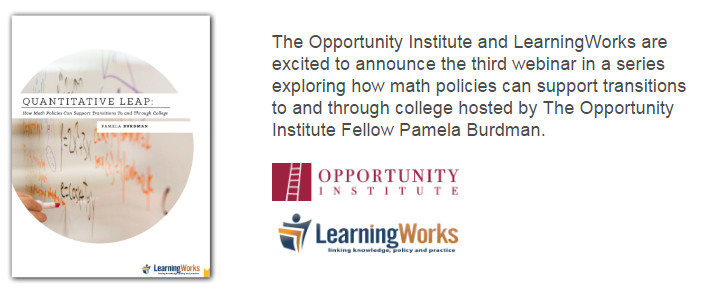Webinar Series # 3: Quantitative Leap How Math Policies Can Support Transitions To and Through
Sep 13th, 2016

Webinar 3 – High School Math Course-Taking and College Readiness
September 21, 1:00 pm – 2:15pm Pacific (4pm – 5:15pm Eastern)
As education systems in California and nationally consider strategies for improving students’ college readiness, high school math sequences are in the spotlight. How much and what sort of math do students need in high school to be academically prepared for postsecondary education? And what are the implications of changes in higher ed policies for admission, placement, and course pathways? Join us to learn about current research and policy discussions on the connections between high school course-taking in mathematics and readiness for college.
For more information, and to register CLICK HERE.
Featuring:
Sonya Sedivy, University of Wisconsin-Madison, Associate Scientist
Julian Betts, University of California-San Diego, Professor of Economics
Louise Jaffe, Santa Monica College, Trustee
David Barsky, California State University-San Marcos, Associate Professor of Mathematics
Host:
Pamela Burdman, Education Policy Analyst, Opportunity Institute Fellow
If you missed the first two webinars, you can find Webinar 1 on state-level efforts to transform postsecondary mathematics here and Webinar 2 on new placement policies designed to address the limitations of commonly-used placement exams here.
Stay tuned for Webinar 4 in October, which will delve more specifically into senior-year transition courses, classes designed to provide a boost for students who otherwise would not be on track to be ready for college-level math.
|
The Quantitative Leap! Series is an outgrowth of the Quantitative Leap policy brief by Pamela Burdman recommending three strategies for ensuring that math policies support college success: (1) ensure that quantitative reasoning requirements are evidence-based and reasonably consistent across educational systems, (2) rely on evidence to ensure validity and efficacy of placement tests and measures, and (3) improve quality, availability, and variety of high school courses that prepare students to be college ready in math. The brief and webinar were supported by LearningWorks and the Opportunity Institute with funding from the Irvine Foundation, College Futures Foundation, and the California Education Policy Fund.
Stay tuned for future webinars in the series on topics such as leveraging the senior year for success in mathematics and more.
The Opportunity Institute is a non-profit organization that promotes social mobility and equity by improving outcomes from early childhood through early career. We focus on education and the related social policies that make true educational opportunity possible. For more information, please visit theopportunityinstitute.org.
|
|

